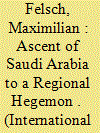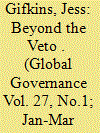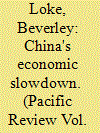|
|
|
Sort Order |
|
|
|
Items / Page
|
|
|
|
|
|
|
| Srl | Item |
| 1 |
ID:
173974


|
|
|
|
|
| Summary/Abstract |
After the Arab upheavals that began in 2011, Saudi Arabia became the most dominant power in the Arab world. While most of its Arab rivals experienced political and economic crises and disintegration, the Gulf monarchy began an unprecedented active and even interventionist foreign policy and increased its regional influence tremendously. Remarkably, most of this activism was not exercised unilaterally but within regional institutional frameworks, mainly of the League of Arab States (LAS) and the Gulf Cooperation Council (GCC). This article investigates how Saudi Arabia gained institutional power within the LAS. The analysis is based on the LAS decisions at the Summit level before and after the Arab uprisings with regard to Saudi Arabia’s main foreign policy interests. The purpose of the article is to examine the essence of Saudi Arabia’s regional power. It also looks at the unforeseen revitalization of the LAS and allows predictions of the future of Arab regionalism in a changing Arab world.
|
|
|
|
|
|
|
|
|
|
|
|
|
|
|
|
| 2 |
ID:
184641


|
|
|
|
|
| Summary/Abstract |
The formal rules governing the UN Security Council offer little insight into how negotiations are conducted on a day-to-day basis. While it is generally assumed that permanent members dominate negotiations, this article investigates avenues for influence for elected members and the UN Secretariat. Institutional power is used to show how permanent members adopt dominant positions in negotiations extending far beyond their Charter-given privileges. Dominance of permanent members is moderated, however, by the legitimacy that support from elected members brings to a resolution. Similarly, the UN Secretariat can use its legitimated authority to influence decisions. The article argues that informal practices are key in understanding how power and influence are allocated in the Council and it forms a building block for future analyses of Security Council practices. This argument also has implications for the perennial reform debates and the prospects for informal reform.
|
|
|
|
|
|
|
|
|
|
|
|
|
|
|
|
| 3 |
ID:
115026


|
|
|
|
|
| Publication |
2012.
|
| Summary/Abstract |
Under what conditions and to what extent do external officeholders in parliamentary democracies constrain the cabinet's freedom of action? The article argues that we must analyse both institutional powers and officeholders' incentives to use them to obtain an unbiased estimate of the expected constraint. It measures the incentives dimension via the selection method of external officeholders and develops an index to capture the likelihood that such officeholders hold preferences deviant from those of the cabinet. Analysing original data on four external constraint institutions in 25 European democracies, the article shows major variation in the incentives to constrain the cabinet across both offices and countries. Furthermore, it demonstrates that institutional powers and incentives for their use are empirically largely independent dimensions.
|
|
|
|
|
|
|
|
|
|
|
|
|
|
|
|
| 4 |
ID:
161564


|
|
|
|
|
| Summary/Abstract |
China's spectacular economic growth over the past decades has given rise to a more confident and proactive China in global governance. China is now an institution-builder, with new Chinese-led institutions such as the Asian Infrastructure Investment Bank designed to cement Beijing's central role in global economic governance. What, then, are the potential implications of a slowing economy for China's institutional power and global governance role? This article locates China's economic growth and slowdown in broader discussions about China's global position and questions about responsibility, order and governance. It argues that China's economic slowdown will not result in a drastic impact on Beijing's institutional power as there are key material, historical and ideational drivers at play here. Unless China is confronted with the prospect of an economic collapse, it will continue to pursue an active institutional role, speak the rhetoric of South–South solidarity with emerging economies and seek a leadership role in reforming global economic governance, even with a slowing economy, because this is intrinsically tied to its identity and how China now positions itself in an evolving global order.
|
|
|
|
|
|
|
|
|
|
|
|
|
|
|
|
| 5 |
ID:
113064


|
|
|
|
|
| Publication |
2012.
|
| Summary/Abstract |
The role of the ISI, post memogate and Mehrangate, may have come under increasing scrutiny, but its institutional power still remains unchallenged.
|
|
|
|
|
|
|
|
|
|
|
|
|
|
|
|
| 6 |
ID:
129578


|
|
|
|
|
| Publication |
2014.
|
| Summary/Abstract |
This article analyses the evolution of European Union (EU) police cooperation on the basis of structural processes in the form of agencification, regulation and standardization, as well as substantive processes in the form of information-sharing and multi-disciplinary cooperation. The Lisbon Treaty holds some key conditions for further integration. The level of integration of police cooperation in the EU is measured by analysing institutional power, the regulatory framework and transnational professionalism. Despite a positive score on each of these levels, member states remain caught between national sovereignty and solidarity. As a consequence, they face an implementation gap and have not embedded European police cooperation in their domestic systems. Building on the pro-integrative moves that have been introduced by virtue of the Lisbon Treaty, improved governance and deeper integration can be achieved by means of more active parliamentary involvement, independent police oversight (both at European and at the national level), the mainstreaming of cooperation mechanisms and a systematic Europe-wide cultivation of police professionalism. Within the realm of internal security cooperation in the EU, a concerted effort is required which demands close consultation between relevant institutional actors and the professional actors in the member states.
|
|
|
|
|
|
|
|
|
|
|
|
|
|
|
|
| 7 |
ID:
146249


|
|
|
|
|
| Summary/Abstract |
This essay explores aspects of the relationship between political leadership and institutional power, comparing the different forms that presidential institutions have taken across the world and identifying the relationship between these structures and social, political, and economic outcomes. Semipresidential systems are distinguished from presidential systems, and within the former, a distinction is made between president-parliamentary and premier-presidential regimes. Some scholars have argued that presidential regimes are less conducive to the successful transition from authoritarian rule to democracy than are parliamentary governments, but the empirical evidence is contradictory. Recent research has, however, drawn attention to finer distinctions within the various broad categories of presidentialism, focusing on more precise institutional arrangements and trying to identify which are more, and which are less, consonant with the consolidation of democracy.
|
|
|
|
|
|
|
|
|
|
|
|
|
|
|
|
|
|
|
|
|